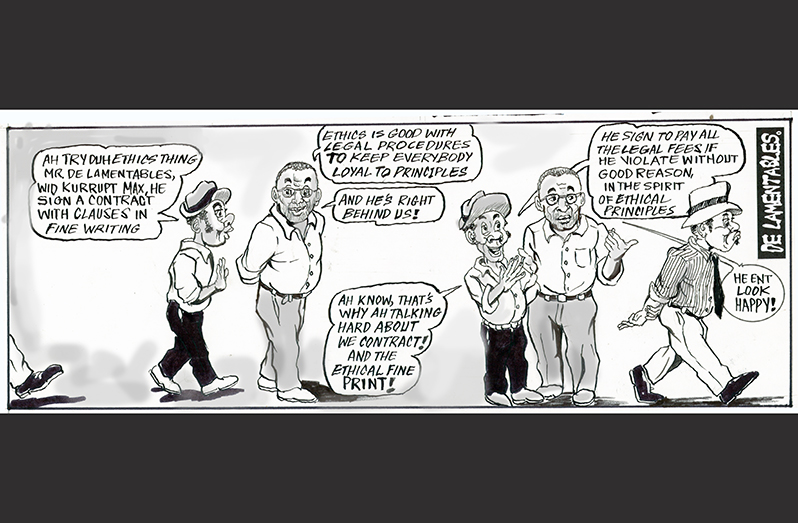ETHICS is the scientific addressing of moral guiding principles in human social behaviour. It is a secular programme outlining (the PLUS) rational approaches to public office, family life and moral evaluation of relationships across the echelons of encounters, small and great, in the process of evaluating proven principles as against popular logic that will misguide. Why is this necessary? Because we live in an era that presents platforms of suggestions, dogmas, philosophies and popular belief exchanges that are imposing enough to change how we live with each other, like no other era before, domestically and otherwise.
How do we determine what is right against what is misguiding when faced with difficult social and economic challenges? With the advent of social media, sensitivity awareness must exist. Offensive human behaviour is not new, and must not be imported in a copycat fashion, allowing attitudes of rudeness defying reason to become a personal trait.
Indeed, “there is a time for everything under the sun”, and much is compelled by daily events, good and bad, that impact our social life. How do we construct the individual creed to make a difference, first in our lives, then equip ourselves to influence those around us? We must stay the rational course when disappointment grins in defiance. This is a tempting response at an individual level, when efforts fail in the face of overwhelming negativity, presenting the imposition that “This is how we do it now!”
 We have suffered through in-house influences and retrogressive overseas behaviour patterns without engaging the origin, relevance and imposing cultural traits that shape, in the context of both (in-house and foreign) what are responsible for the adaptation or development of specific negativities. Conversations and actions within families, groups and supposed colleagues echo that dominance, lack of empathy and self, by any means necessary, were always right. Human cultural behaviour functions on what it has experienced, witnessed, and the logic that it was taught.
We have suffered through in-house influences and retrogressive overseas behaviour patterns without engaging the origin, relevance and imposing cultural traits that shape, in the context of both (in-house and foreign) what are responsible for the adaptation or development of specific negativities. Conversations and actions within families, groups and supposed colleagues echo that dominance, lack of empathy and self, by any means necessary, were always right. Human cultural behaviour functions on what it has experienced, witnessed, and the logic that it was taught.
Thus, the mind that has no prior capability to draw from an arsenal of common ideas, learned but not tested, will then need to critically balance the new enticing ‘custom of practices’ being proposed. And it will be found to be difficult to analyse the new logic and its assuring suggestions, implying decisions on the immediate, against considerations on reflection of the more likely harsh life-changing consequences proposed by the same decisions. For example, flashback to the incident at the airport some years ago, with a man and a suitcase with ‘illegal drugs’, and on the way to departure, he opted out of the operation and hurriedly headed out of the airport, abandoning the suitcase. Were I the arresting rank that later questioned him, I would have wanted to know what was the inspiring notion when he entered the proposal, and the awareness that alerted him, causing him to abort it all in such a frantic manner?
I did not do ethics in school; I’m not sure that it was ever taught in our schools by that name. I do know that we did Scripture, but by the time I was in Second Standard, that was not a subject anymore. But then, there was Reading on the Timetable, and the discussions that followed entailed reasoning on characters that enabled perspectives on attitudes, motives and the question of what was noble, ignoble, good, not so good, and pure insincerity (evil).
This enabled a working understanding that even if, with intent, you divert, stumble and survive, there is a learned volume of references that are ethical in context, that can activate redemption. “What we call society and ‘the streets’ is open and eager to consume souls”, as the Cat Stevens song ‘Wild World’ implied, “it’s hard to get by on a smile”. At an early age, I was instructed that your credibility is a crucial asset if you want to be taken seriously. I didn’t understand this concept until maturity. Over the past years, conversations with friends brought up subjects about the experiences we had in the communities we had evolved from. Some of the words of wisdom that have endeavoured us to persist and, when necessary, evolve.
I was lucky to have lived in both rural, though for a shorter time, and urban communities. In a discussion with some brethren from boyhood days and our teenage timeline, we reflected with an awareness that the worst level of poverty is illiteracy. It disabled explorations into alternate ideas, against the dictates and concepts that are presented at corner gaff and reasonings, depending on who is the dominant authority. Though half-baked, it presented, as they say, as ‘Gospel Truth’, and we realised that because of social conditions, a subculture of survival could become a justified custom of practice, decorated with a creed of its own, that may be relevant to those who live it for a time.
But it becomes counter-productive with social changes, because social cultures do not remain stagnant, and change demands a revolution within. The balance of ethical reasoning can prevail for the evolution of a culture without losing its functioning identity.
There is knowledge in every experience. As humans, individuals and nations, when faced with personal controversy, we take forbidden chances; even making a habit of poor choices. Still, without the inner arguments of ethical dialogue, the redeeming acknowledgement of individual error cannot be reconciled with. Thus, it must begin early, to be able to balance the scales; it must be taught to be an organ of the subconscious.





.jpg)








